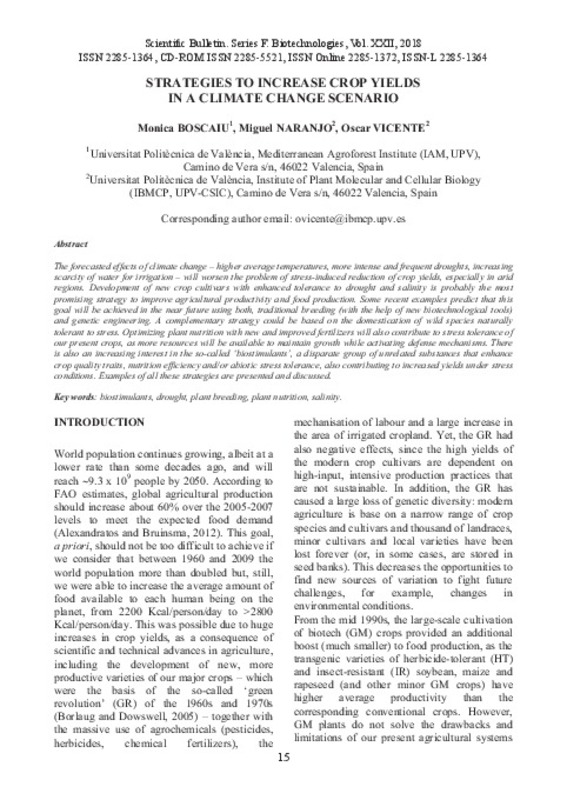JavaScript is disabled for your browser. Some features of this site may not work without it.
Buscar en RiuNet
Listar
Mi cuenta
Estadísticas
Ayuda RiuNet
Admin. UPV
Strategies to increase crop yields in a climate change scenario
Mostrar el registro sencillo del ítem
Ficheros en el ítem
| dc.contributor.author | Boscaiu, Monica
|
es_ES |
| dc.contributor.author | Naranjo Olivero, Miguel Angel
|
es_ES |
| dc.contributor.author | Vicente, Oscar
|
es_ES |
| dc.date.accessioned | 2019-07-05T20:02:25Z | |
| dc.date.available | 2019-07-05T20:02:25Z | |
| dc.date.issued | 2018 | es_ES |
| dc.identifier.uri | http://hdl.handle.net/10251/123232 | |
| dc.description.abstract | [EN] The forecasted effects of climate change ¿ higher average temperatures, more intense and frequent droughts, increasing scarcity of water for irrigation ¿ will worsen the problem of stress-induced reduction of crop yields, especially in arid regions. Development of new crop cultivars with enhanced tolerance to drought and salinity is probably the most promising strategy to improve agricultural productivity and food production. Some recent examples predict that this goal will be achieved in the near future using both, traditional breeding (with the help of new biotechnological tools) and genetic engineering. A complementary strategy could be based on the domestication of wild species naturally tolerant to stress. Optimizing plant nutrition with new and improved fertilizers will also contribute to stress tolerance of our present crops, as more resources will be available to maintain growth while activating defense mechanisms. There is also an increasing interest in the so-called `biostimulants¿, a disparate group of unrelated substances that enhance crop quality traits, nutrition efficiency and/or abiotic stress tolerance, also contributing to increased yields under stress conditions. Examples of all these strategies are presented and discussed. | es_ES |
| dc.language | Inglés | es_ES |
| dc.publisher | University of Agronomic Sciences and Veterinary Medicine of Bucharest, Romania - Faculty of Biotechnologies | es_ES |
| dc.relation.ispartof | Scientific Bulletin. Series F. Biotechnologies (Online) | es_ES |
| dc.rights | Reserva de todos los derechos | es_ES |
| dc.subject | Biostimulants | es_ES |
| dc.subject | Drought | es_ES |
| dc.subject | Plant breeding | es_ES |
| dc.subject | Plant nutrition | es_ES |
| dc.subject | Salinity | es_ES |
| dc.subject.classification | BIOQUIMICA Y BIOLOGIA MOLECULAR | es_ES |
| dc.subject.classification | BOTANICA | es_ES |
| dc.title | Strategies to increase crop yields in a climate change scenario | es_ES |
| dc.type | Artículo | es_ES |
| dc.rights.accessRights | Abierto | es_ES |
| dc.contributor.affiliation | Universitat Politècnica de València. Departamento de Ecosistemas Agroforestales - Departament d'Ecosistemes Agroforestals | es_ES |
| dc.contributor.affiliation | Universitat Politècnica de València. Departamento de Biotecnología - Departament de Biotecnologia | es_ES |
| dc.description.bibliographicCitation | Boscaiu, M.; Naranjo Olivero, MA.; Vicente, O. (2018). Strategies to increase crop yields in a climate change scenario. Scientific Bulletin. Series F. Biotechnologies (Online). 22:15-20. http://hdl.handle.net/10251/123232 | es_ES |
| dc.description.accrualMethod | S | es_ES |
| dc.relation.publisherversion | http://biotechnologyjournal.usamv.ro/ | es_ES |
| dc.description.upvformatpinicio | 15 | es_ES |
| dc.description.upvformatpfin | 20 | es_ES |
| dc.type.version | info:eu-repo/semantics/publishedVersion | es_ES |
| dc.description.volume | 22 | es_ES |
| dc.identifier.eissn | 2285-1372 | es_ES |
| dc.relation.pasarela | S\373896 | es_ES |






